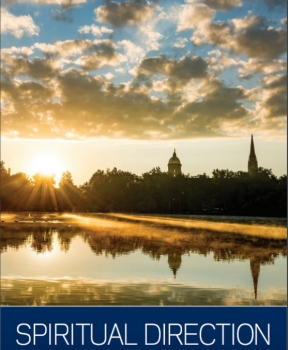Alice Fryling says that – “Spiritual direction is a way of companioning people as they seek to look closely, through the eyes of their hearts, at the guidance and transforming work of God in their lives.” [2] For example, Evelyn Underhill (1875-1941), who in spite of having received “no formal education in the area of MYSTICISM,” yet who became a recognized authority on the subject, became so via “the influence of Baron Friedrich von Hugel [1852-1925], her friend and spiritual director . . .” [3]
SPIRITUAL DIRECTOR appears to mimic the role of an EASTERN RELIGIOUS GURU who tries to affect the spirituality of others in either one-on-one or small group settings. As Fryling states, “People throughout the Christian church, including those of an evangelical orientation, are experiencing again the gifts that God gives to his people through the loving listening and the gentle guidance of spiritual directors.” [4] So what is the Bible-believing Christian to think of this so-called gift of a spiritual director?
We should know, first of all, that among the lists of gifts in the New Testament (Romans 12:5-8; 1 Corinthians 12:4-11, 28-31; Ephesians 4:11; 1 Peter 4:9-10), there is no spiritual gift of spiritual director!
Second, the central gifts for the church’s edification are those of “teacher” and “pastor-teacher.” The risen and ascended Christ gave these gifts to the body of Christ so that it might come to, “the unity of the faith, and of the knowledge of the Son of God . . . That we henceforth be no more children, tossed to and fro, and carried about with every wind of doctrine, by the sleight of men, and cunning craftiness, whereby they lie in wait to deceive . . .” (Ephesians 4:11-14). The exercise of these gifts is consistent with the example of Jesus. In the gospels, He was primarily known as, “Teacher” (Matthew 8:19). Too, Jesus commissioned the disciples to make disciples via a two-fold process of “baptizing” and “teaching” them (Matthew 28:19-20). According to Paul’s ministry, the exercise of “the gift of teacher” is consistent with not only Paul’s example, but also with his exhortation to Timothy (1 Corinthians 4:17; 1 Timothy 4:11; 6:2). As distributed by the sovereign Spirit of the ascended and Christ, the spiritual gift designed to bring maturity and unity to the local church is “pastor-teacher,” not “spiritual director.” That is why Fryling must state that, “spiritual direction groups” are an “exciting new branch from an ancient tree . . . a practice that began in the early years of Christianity when people followed the desert mothers and fathers out to the wilderness to ask them how to know God.” [5]
=> There is no gift of “spiritual director” which is sourced in the Bible and bestowed by the Spirit of the Living Christ.
What is important to the church is not that people, in one-on-one, or in small group sessions, listen to spiritual directors and vice versa–though sharing fellowships have their place in the local church–but that people listen to God, and the emphasis upon listening to one another does not qualify as listening to God, for we are neither God nor gods. As the Lord said to His people through the psalmist, “Oh, that My people would listen to Me, / That Israel would walk in My ways!” (Psalm 81:13) One OT scholar remarks:
To listen . . . has the double force in Hebrew which it sometimes has in English: to pay attention and to obey. So this saying is close to the famous words of Samuel, “to obey (lit. to listen) is better than sacrifice”. [6]
I fear that the gift of so-called spiritual director is just another guru-gimmick which sources spirituality in religious opinions, teachings, and practices that are utterly foreign to Holy Scripture, and such a source of spirituality will not promote the unity of faith amongst believers, as does the legitimate gift of pastor-teacher, but a diversity of beliefs revealing that all the spiritual directors and listeners are being “tossed to and fro, and carried about with every wind of doctrine.”
For this usurping of the ministry of pastor-teacher by spiritual directors in local churches, pastors are to blame. By allowing methods to trump the message, they created the spiritual vacuum into which spiritual directors have moved in, and instead of being unified, Christians will become increasingly diversified (and apostate) as pan-evangelicalismism, under the tutelage of spiritual directors, bows before the MYSTICISM of the POSTMODERN culture.
____________________
ENDNOTES
[1] Emphasis mine, Alice Fryling, “A First Look at Spiritual Direction Groups,” Small Groups.com, Posted 5/11/09.(http://smallgroups.com/articles/2009/firstlookspiritualdirectiongroups.html). This article is no longer posted on the website. See also Alice Fryling, “What Happens in Group Spiritual Direction?” SmallGroups.com, Posted 6/29/09 (http://www.smallgroups.com/articles/2009/whathappensingroupspiritualdirection.html).
[2] Ibid.
[3] Emphasis Mine, The Very Reverend Alan Jones, “Forward,” Evelyn Underhill, The Life of the Spirit and the Life of Today (San Francisco, CA: Harper & Row, Publishers, 1949): xii.
[4] Fryling, “Spiritual Direction Groups.”
[5] Ibid.
[6] Derek Kidner, A Time to Mourn, and a Time to Dance (Downers Grove, IL: InterVarsity Press, 1976): 53.
[7] “T-groups,” Wikipedia (http://en.wikipedia.org/wiki/T-groups).


Recent Comments